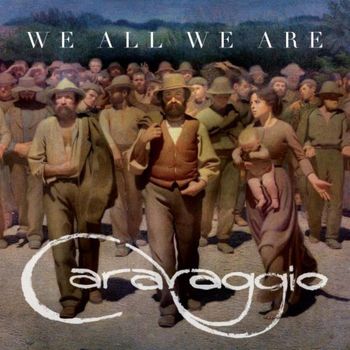Let's get one thing straight—Caravaggio isn't your average prog outfit noodling in 7/8 and calling it innovation. This is Art Prog with a Mediterranean soul, and We All We Are is their sonic manifesto. Picture a classic rock backbone—electric guitar, bass, drums—then lace it with bouzouki, accordion, mandolin, and yes, jigsaw percussion. Their sound doesn't just flirt with genre—it dismantles it. You've got art rock, hard rock, world music, and progressive rock all tangled together in a way that somehow feels effortless. The compositions are full of unconventional chords, ethnic melodies, and jazz harmonies that refuse to play by the rules. And rhythmically? Forget 4/4—Caravaggio thrives in odd time signatures, using them not just for complexity, but for emotional release. The goal here isn't just to be clever—it's to be catchy and original, without sacrificing depth. And spoiler alert: they nail it. This album doesn't ask for your attention—it demands it. So let's dive in. The musicians on We All We Are aren't just players—they're architects of a soundscape that's as intricate as it is evocative. Frontman Vittorio Ballerio delivers vocals with a theatrical edge, shifting from intimate whispers to impassioned declarations - equal parts anguish and elegance. Fabio Troiani, the mastermind behind the guitar work, programming, and arrangements, stitches together the album's eclectic textures with precision and flair. Serhan Kazaz adds depth with his bouzouki and vocals on White Lies On Our Black Tongues, bringing a darker, more dramatic tone. The rhythm section—Piero Chiefa on bass and glockenspiel, and Alessio Del Ben on drums—anchors the chaos with tight, deliberate grooves. Accordion duties are split between Stefano Spitale, Tiziano Chiapelli (who solos beautifully on track 3), and Giulia Bertassi (whose ghostly shimmer haunts track 8). Backing vocals from Guido Block and Margherita Fossati add warmth and harmonic richness, while Lorenzo D'Erasmo closes the album with a percussive and flute-driven frenzy on Divine Comedy Tarantella. Each musician brings their own flavor, but together they form a collective voice that's bold, nuanced, and unmistakably Caravaggio. Isolation opens with slow-building tension. The mix is sparse at first, then blooms with layered percussion and accordion. Vocals are intimate, setting the tone for existential reflection. The "chorus" vocals remind me of Wetton/Manzanera or 801 but with a darker edge. The next track, Rejoice, has a deceptive title - the track is rhythmically jagged, with syncopated drums and bass. The production leans jazz-rock, with tight compression on the rhythm section and airy reverb on backing vocals. In The Place Where I Was Born features ethnic melodies which swirl around a melancholic vocal line. The mix is lush, with stereo imaging that places you inside a memory. The title track, We All We Are, is a manifesto. Guitars are gritty, drums punchy, and the bouzouki adds urgency. Vocals are layered—almost choral—underscoring the theme of collective identity. The production here is bold, with dramatic shifts in dynamics. Controversial is a slow burn. Bass and glockenspiel and distant drums create a hypnotic groove. The mix is dry, almost claustrophobic, reflecting the lyrical tension. A standout for its restraint. The production on White Lies On Our Black Tongues is theatrical—accordion ambience floats with a guitar rhythmic pattern while the bass and drums march forward. A sonic allegory. Behind The Mask, Part 1 is a short interlude. Minimalist production—just voice, guitar, and ambient textures. It's a palate cleanser before the storm. Behind The Mask, Part 2 builds on Part 1 with full instrumentation. The mix is layered but never muddy. The track crescendos into a wall of sound, then fades like a dream. Divine Comedy Tarantella is a wild finale. The addition of D'Erasmo's percussion and flute steal the show. The mix is frenetic—accordion, bouzouki, and drums all vying for attention. It's chaos, but controlled. A fitting end to a philosophical journey. We All We Are is a production triumph. It's not just an album—it's a sonic mosaic, shadowy, dramatic, and layered with meaning. Every track is a chapter, every instrument a character. If you're into albums that reward deep listening, Caravaggio delivers in spades. Now go spin it. Preferably on headphones. Preferably in candlelight. Preferably with wine. Red. Italian **** David Carswell Where to buy? |
